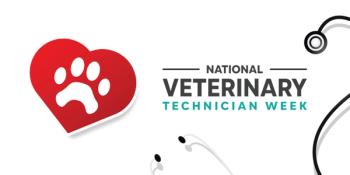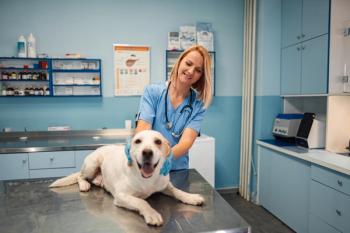
When clients say no: difficult exam room conversations (Proceedings)
You all know the feeling of walking into an exam room, proud of your skills as a veterinary technician, confident that you know what is best for the patient, happy to be greeted by that wagging tail, and excited to work together with the client to keep their family member at his healthiest.
You all know the feeling of walking into an exam room, proud of your skills as a veterinary technician, confident that you know what is best for the patient, happy to be greeted by that wagging tail, and excited to work together with the client to keep their family member at his healthiest. But, before you know it, the wind is taken out of your sails when your attempts at offering the best medicine are met with a response of "no," or "we have financial constraints," or "we can't afford it," or the dreaded "if you really cared, you'd cut us a break or fix him for free" etc. If this is not demoralizing, I sure don't know what is!
During this presentation we will review how to keep your skills sharp even when you may not be allowed to provide the best medicine, how to make sure the pets are getting the best care possible under the circumstances, learn how to have non-confrontational conversations about tough subjects (money!), learn how to educate the clients about the "gold" standard of medicine without them feeling guilty about not being able to do what is best, learn how to get compliance from owners, and, most importantly, learn how to keep yourselves and those around you motivated and morale high even in these tough times.
Think about the appointments that you helped the veterinarian with yesterday, or the last day you were in your hospital before you came to this conference, or even back to last week's appointments. Were you met with resistance from any of your clients? This could be resistance in the form of not wanting to do that heartworm test before renewing their heartworm prevention prescription. Or, it could be resistance in the form of refusing a referral to a specialist. Or, perhaps it was a client who came in on emergency and refused to do radiographs on their vomiting dog. Or, do we still have clients who try to refuse a wellness examination and "just want the shots?" Think about what responses you received when you tried to educate or provide a service to a client that you knew was in the best interest of their pet and they wouldn't listen or refused....Now, think about how you reacted to this response. It is human nature for us to get defensive or frustrated when our credibility is questioned ("does Fido really need that?") and even to feel rejected. And, it is perhaps even worse to feel that your role as an advocate for the pet is being ignored and that that patient may suffer as a result.
What can we do about all of this? If we can discuss and answer the six questions below together during this presentation all of us will leave with fresh ideas that we can take home and use tomorrow. And, we will all leave this presentation feeling passionate about what we do and knowing that we can still make a difference in the lives of the pets that we care about!
1. How do you keep your skills sharp even when you may not be allowed to provide the best medicine?
a) Do daily rounds on the patients in the hospital
b) Create pretend cases and discuss the best course of treatment
c) Do "mock" emergency drills
d) Have regular meetings where "gold standard" protocols and procedures are reviewed
e) Read appropriate trade journals, magazines, books
f) Go to CE!
g) Provide CE for your fellow employees
2. How do you make sure the pets are getting the best care possible under the circumstances?
a) Always provide the "gold standard" of care first
b) Work with the client to find a realistic option that balances their finances and the best care possible
c) Don't assume that if a client can't afford the best care that will only choose a "treat and street" option or just the basics
d) Create a long range plan which could include spreading out services over weeks or months
e) Provide multiple options for how the client can pay
3. How do you have conversations about tough subjects (particularly about money)?
a) Be direct and do not avoid these conversations - be prepared to discuss money and options immediately
b) Be open and honest and prepared – have Medical Treatment Plans for review (that include options)
c) Listen to the concerns of the clients and do not make assumptions
d) Ask appropriate questions
e) Acknowledge the client and their concerns
f) Understand that emotions can take over when you talk about family members (the pet) and money independently of one another...and this is a conversation involving both
g) Be empathetic!
h) Be confident in your knowledge of the subject matter
i) Be clear in your recommendations
j) Consider your tone and body language
k) Consider how you are reacting to the conversation
l) Take personality in to consideration
m) Work together to find a solution
n) Be confident and knowledgeable in the "product" you are selling
o) Know what differentiates you from others
4. How do you educate the clients about the "gold" standard of medicine without them feeling guilty about not being able to do what is best?
a) The skills you learn in question #3 will help with this!
b) Empathy and understanding are the name of the game - think about how you are making the client feel
c) Reward and recognize what the client IS able to provide
5. How do you get compliance from owners?
a) A consistent message from the veterinary profession about the importance and frequency of veterinary care is needed (from the Bayer/Brakke/NCVEI Study released Jan 2011)
b) Veterinarians must communicate the value of regular care to avoid deterring pet owners from making annual visits a priority (from the Bayer/Brakke/NCVEI Study)
c) Make our practices more "feline-friendly (from the Bayer/Brakke/NCVEI Study)
d) Provide reminders and call backs. Schedule rechecks prior to the client leaving.
e) Work with our clients instead of against them. Be partners in the care of their pets!
f) Provide an environment that offers phenomenal customer service
6. How do you keep yourselves and those around you motivated and morale high even in these tough times?
a) Share the success stories
b) Let go of the not so good stories
c) Recognize and reward the clients who are doing everything they can
d) Have fun at work!
e) Focus on the positive!
f) Remember that you are passionate about veterinary medicine!
Newsletter
From exam room tips to practice management insights, get trusted veterinary news delivered straight to your inbox—subscribe to dvm360.






